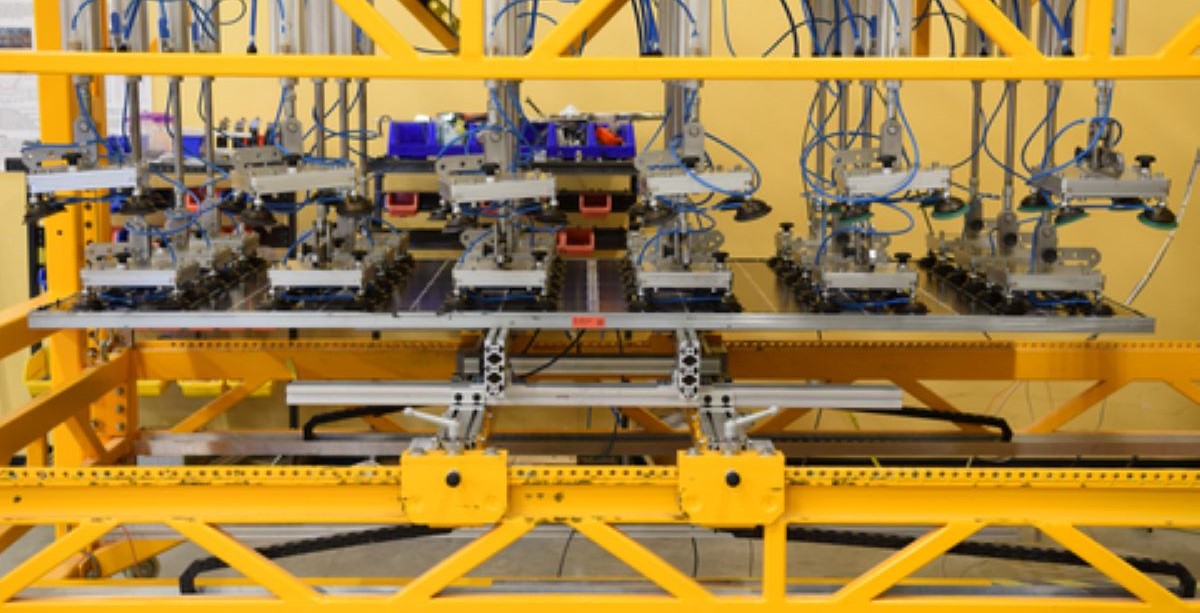Origami Solar, a U.S-based developer of a recycled steel module frame as an alternative to conventional aluminum frames, announced it passed several key third party tests, now making its frames available to module manufacturers for validation and further testing*.
Origami said its rolled steel frames passed third party tests at U.S.-based CFV Labs and the Renewable Energy Test Center (RETC), the same tests that that customers will have to undergo on the way to certification, namely International Electrotechnical Commission (IEC) 61215 static mechanical load testing and IEC 61701 salt-mist corrosion testing and continuity testing of bonding. The Origami frames were also put through test-to-failure runs.
“Following these tests, it is clear that module makers will have no issues getting their modules certified with our current frame design. Our production-ready frames are available now to ship to module manufacturers for evaluation, testing and certification,” Origami Solar vice president of engineering Lauren Ahsler told pv magazine.
In a statement, Colin Sillerud, vice president of engineering at CFV Labs, indicated outperformance in the lab. “The steel-frame modules supplied by Origami to CFV for testing exhibited test-to-failure pressure values that were higher than similarly sized and constructed modules with aluminum frames. While CFV cannot say that laboratory tests translate directly to field performance, these results show a strong relative lab performance when compared to traditionally framed PV modules.”
The static mechanical load tests, specified in IEC 61215 were carried out with three cycles of one hour of down push pressure and one hour of uplift pressure at pressure levels +/-2400 Pa for a 400 mm tracker mount*. “When using quarter point clamps along the module long side, with racking below the module, the modules passed the same cycle times but with down push pressure of 5400 Pa and uplift pressure of 3000 Pa,” said the manufacturer.
RETC’s salt mist corrosion and continuity testing on modules using Origami’s steel solar frames demonstrated similarly successful results, which the startup says confirms the corrosion protection performance of its zinc-aluminum-magnesium coatings.
Popular content
“The salt mist testing methods are the type typically used for land-based solar, known as IEC 61701 method six,” explained the manufacturer, adding that the testing sequences also included testing for continuity bonding both pre-and-post salt mist sequences.
“While these are the first round of testing following the specific provisions set by the IEC and UL to validate the performance of our production-ready design, the combination of extensive prior testing and this latest round of tests have us ready to take our frame to production for our first customer early in 2025,” said Ahsler.
Origami Solar, which was founded in 2019 and a pv magazine 2023 award winner for manufacturing, sees an opportunity to supply module manufacturers in the U.S. market who are switching from imported aluminum frames to domestically made steel frames. It also uses recycled steel from suppliers in the US and Europe in its frames to give it a competitive edge when it comes to greenhouse gas scoring as assessed by Boundless Impact.
When it comes to price, Ahsler said, “Module makers will be the real winners thanks to our steel frames. For a competitive price, they will get a product with a completely domestic supply chain, with far less embodied carbon, and, as the testing shows, a product that offers greater protection.”
*This article was amended on 17 April 2024 to clarify the testing status and the type of tracker mount.
This content is protected by copyright and may not be reused. If you want to cooperate with us and would like to reuse some of our content, please contact: editors@pv-magazine.com.


By submitting this form you agree to pv magazine using your data for the purposes of publishing your comment.
Your personal data will only be disclosed or otherwise transmitted to third parties for the purposes of spam filtering or if this is necessary for technical maintenance of the website. Any other transfer to third parties will not take place unless this is justified on the basis of applicable data protection regulations or if pv magazine is legally obliged to do so.
You may revoke this consent at any time with effect for the future, in which case your personal data will be deleted immediately. Otherwise, your data will be deleted if pv magazine has processed your request or the purpose of data storage is fulfilled.
Further information on data privacy can be found in our Data Protection Policy.